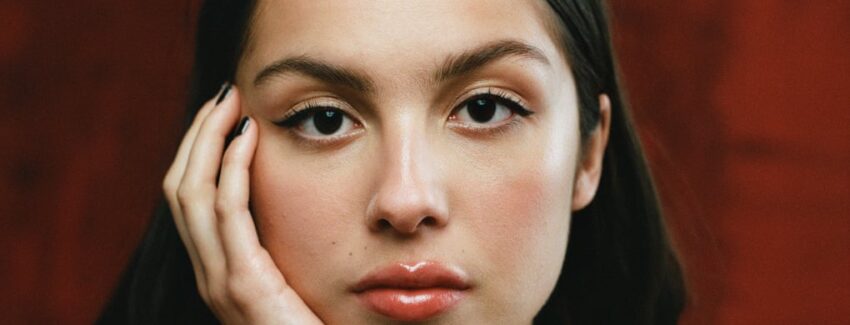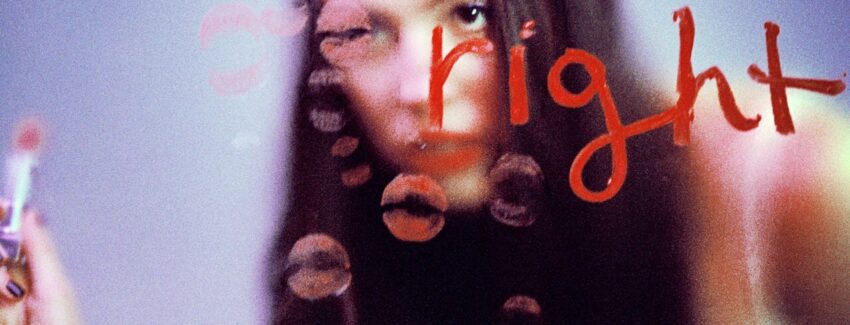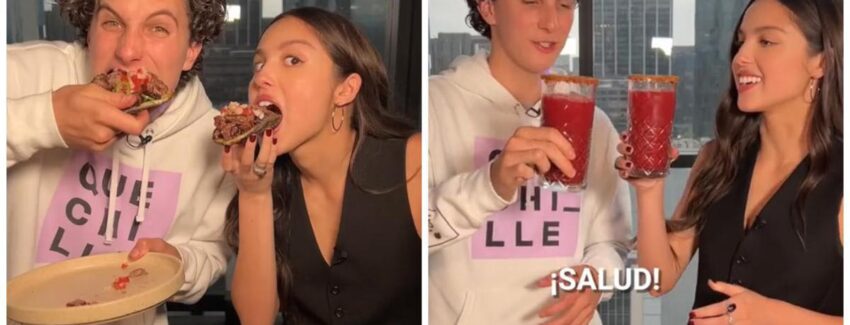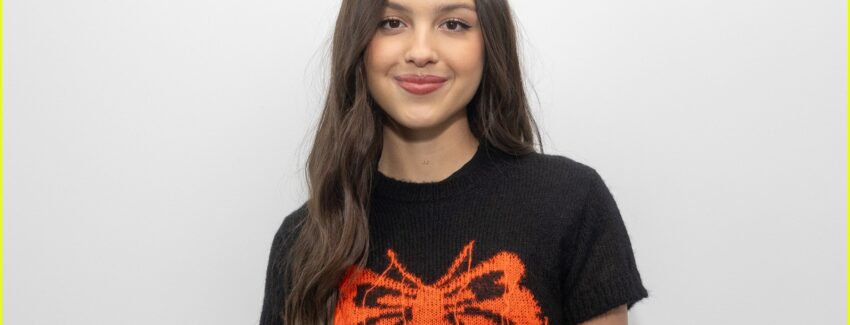Olivia Rodrigo is feeling kind of crazy. The 20–year–old former Disney kid, who shot to pop superstardom with her debut album, Sour, just released her highly anticipated new single “vampire” hours earlier, and her nerves are too real. It’s also our first taste of her sophomore album Guts, and an indication that she’s taken the special sauce that’s gotten her to this point and added some extra heat. One person that can’t get enough is the singer Phoebe Bridgers, who got on a call with Rodrigo to talk about post–tour blues, Twilight fandom, and the side effects of mega–fame.
SPEAKER 3: So sorry. Phoebe’s just having some service issues, so she’s trying to call in, but it’ll just take another second.
Olivia Rodrigo: No worries. Thanks, Kelly. [Long pause]
Phoebe Bridgers: Hello? I finally figured out my service.
Rodrigo: Hi! Thank you so much for doing this. I’m so stoked.
Bridgers: Dude. Of course. Congratulations.
Rodrigo: Thank you. Congrats to you, too. I’ve been listening to the boygenius album nonstop. It’s so fucking good.
Bridgers: Thank you. Where are you in the world?
Rodrigo: I’m in L.A. with my family in my little house, having a good time trying to keep my head on straight. Release days are always so stressful, so I’m trying to keep it chill. Where are you?
Bridgers: I’m also in L.A., but in a cabin far away.
Rodrigo: That sounds like fun.
Bridgers: Yeah. I just got back from tour and I’m, like, evaporating into my floor.
Rodrigo: Post–tour blues are so real. You’re like, “Someone’s not telling me where to go every second of every day? What do I fill my time with?”
Bridgers: Yeah. I’m absolutely freaked out by the idea of having to make any choice about my life.
Rodrigo: Did you guys have fun?
Bridgers: It was so fun, but I went directly from the Taylor Swift tour to the boygenius tour, so I was like a shell of myself. But they’re the best people to be my shell self around. They’re my best friends.
Rodrigo: Totally. I’ve always wondered what it’s like to tour with a band and have that shared experience and go out to the bar after the show and stuff like that. Because it can get lonely.
Bridgers: We’re very granola.
Rodrigo: [Laughs]
Bridgers: No bar after the show. We cuddle and watch TV.
Rodrigo: Aw, that’s so cute though. I want that.
Bridgers: Hell yeah. Firstly I have to say what an amazing achievement “vampire” is. You must be so, so happy. It just was such an obvious step up from Sour, and I hope you’re feeling it today. Are you?
Rodrigo: Thank you. I’m feeling kind of crazy. It’s very overwhelming, but I’m excited and I feel proud of the people around me who’ve done so much work on everything.
Bridgers: Incredible. What is your favorite vampire movie?
Rodrigo: Twilight. Hands down. I know that’s the most basic one ever.
Bridgers: I feel like every three years of my adult life, I’ve had five days alone at my house and I’m like, “I think I’m going to rewatch the Twilight movies.”
Rodrigo: Time very well spent. The first one’s an impeccable work of cinema. I’ve been obsessed with it since I was so young. My mom found all of these drawings of vampires that I did when I was literally 4 years old. I’m like, “God, I was manifesting this from such a young age.” [Laughs]
Bridgers: I love when the aesthetics of your life kind of work themselves into an album cycle.
Rodrigo: I mean, that just happens. You’re so good at doing that, too.
Bridgers: Thank you. I was going to say, speaking of aesthetics, I literally made my mother buy me the Jansport that Kristen wears in the first Twilight.
Rodrigo: Shut up. I love that. I remember scouring the internet trying to find the purple bedspread that her dad [Charlie Swan] got her in the first movie. That was my shit.
Bridgers: Oh my god. I feel like growing up is being like, “Damn, Charlie’s hot.”
Rodrigo: Exactly. A mustache on a man? Nothing better.
Bridgers: Are you a scary–movie guy or what?
Rodrigo: I’m a big thriller girl, but I watch a few scary movies here and there. Is that your jam?
Bridgers: Surprisingly, no. I hate a scary movie. If there’s any excuse for my brain to have intrusive thoughts it’ll take it.
Rodrigo: Oh, definitely. I convince myself that I see shit after I come home from watching Insidious or something. [Laughs] Also, I watched that new Ari Aster movie Beau Is Afraid and I got so scared. I literally had to walk out of the theater. I have never had such a visceral reaction to a movie in my life. It felt like a bad acid trip.
Bridgers: [Laughs] I’m so glad you brought that up, because you are right. That is the scariest movie I’ve ever seen, but I was laughing the entire time.
Rodrigo: That’s the only reasonable reaction. Your body just can’t process it. You have to laugh.
Bridgers: Who is the first person you send a finished song to?
Rodrigo: I love getting in the car and driving to In–N–Out and playing stuff for my friends. It’s my favorite, but I have this theory that the information that you get from playing your songs for your friends isn’t what they say, it’s how you react to what they say.
Bridgers: Yes.
Rodrigo: It helps you gauge how you feel. But I get really nervous playing people stuff.
Bridgers: Totally.
Rodrigo: You hear it through their ears in the weirdest way. I’ll pick up on stuff that I never picked up on playing it for different people.
Bridgers: Do you ever go to your own Instagram and look at it through the eyes of another person? [Laughs] I feel like that with new music. I’m like, “New person, fresh ears. What does my music sound like?”
Rodrigo: Yeah. When it comes out you feel like you can detach from it a little bit and listen to it like a person for the first time.
Bridgers: Exactly.
Rodrigo: I love that.
Bridgers: Have you ever felt the responsibility to send the subject of a song the song before it comes out, especially now that you have such a giant platform? Or are you just like, “Fuck it, they’re going to hear it with the world.”
Rodrigo: That’s a great question. I feel like last time there was so much weird media shit and I had no idea how to deal with any of it. Literally, it was the first song out of the gate and all of that shit happened. I felt so ill–equipped.
Bridgers: Totally.
Rodrigo: That was an overwhelming experience, but now I definitely feel a responsibility. I just try not to think about it during the writing process.
Bridgers: Totally.
Rodrigo: When I first started writing this record, I would sit at the piano and pretend other people were hearing what I was writing, which is so awful and counterproductive to any creativity, so I had to just write what I wanted to write and think about the social implications after. It’s tricky. I don’t think anyone has it down to a science. I can’t even believe that people listen and talk about my music as it is, so it’s crazy to think about. I guess I’m still learning how to deal with all that stuff.
Bridgers: It just means that the media attention and the scrutiny of your social life didn’t stop you from writing this cutting song, which fucking rocks.
Rodrigo: [Laughs] Thanks, girl. I appreciate you.
Bridgers: How was the transition from writing about the extremely universal experience of being a teenager to writing about the completely unique experience of becoming famous for being authentically yourself ?
Rodrigo: [Laughs] Fuck. I think about that all the time. There’s a sort of wide–eyed innocence to the first album that lots of people picked up on, and I kind of freaked out this time being like, “Oh my god, I don’t have this 17–year–old heartbreak that everyone’s had. My life is different now.” This sounds weird to say, but I think over time, I’ve realized that I’m really not that special. My life is just so—I was home–schooled and all of this stuff happened in my career, but then I really boiled my problems down and I’m like, “Oh, they’re just 19–year–old, 20–year–old problems in a different environment.” If you speak honestly about any experience, then someone is going to find truth in it.
Bridgers: Right. Also, now everyone has an audience because of the way the internet works. The teenagers that come to your show are looking forward to what the video of the Olivia show is going to inspire in their internet presence. We’re all being scrutinized.
Rodrigo: I was so nervous to put out this song, especially the line, “fame fucker.” I love that line.
Bridgers: It’s so great.
Rodrigo: I played it for a few people, and they’re like, “That’s really unrelatable. You can’t write songs about that.” I think you have to be wary about writing songs about fame. A lot of the time people don’t want to hear about that. But fame is more accessible than it has ever been. Everyone is yearning for some sort of internet virality, and there’s so much social climbing and lust for fame in the world that doesn’t have anything to do with living in L.A. or New York. It’s just prevalent in our generation.
Bridgers: Completely. And the character description in the song is like, an archetype of a person who is the most embarrassed by the sole read of being a star fucker. Just being manipulative, that’s not very embarrassing. But the element of, “I know exactly what you were trying to do. I fucking see you,” is what makes the song totally relatable.
Rodrigo: Right.
Bridgers: I feel that from experience writing about older people who are up in your grill, and then two years later you’re like, “That is so embarrassing.” You outgrow them and they’re so much older than you still.
Rodrigo: No, it’s crazy. Life is just embarrassing as fuck.
Bridgers: [Laughs] So embarrassing. Do you think about the types of people that are listening to your songs or do you also have to completely get that shit out of your brain when you’re writing?
Rodrigo: It’s interesting, because I have a very young fan base, so that’s something I think about a lot, especially when I say something weird, or when I say a swear word or something. But I also think that people yearn for that. I think kids love that.
Bridgers: Completely agree.
Rodrigo: We undersell how full of rage and angst young people are.
Bridgers: Yes.
Rodrigo: But this album felt very different to make than Sour. It feels a lot more mature just because of the state of my life.
Bridgers: Well, I think the reason you speak to young people is because you fucking take them seriously. You’re trusting them with your actual experience.
Rodrigo: Right.
Bridgers: What was the weirdest thing on this record that inspired a lyric? Like a fucking podcast or on a billboard or—
Rodrigo: I was thinking about this today. We can cut it out if I’m not supposed to say it, but one of my favorite songs on the record is called “All–American Bitch.” I thought that was such a fun title. I was reading—have you ever read The White Album by Joan Didion?
Bridgers: Yes. It’s the last chapter of that book that haunts me.
Rodrigo: She has so many fucking great quotes. I was reading this bit about her going to San Francisco to meet all these hippies—5–year–olds were dropping acid and going to Grateful Dead concerts. She was talking to some hippie who ran away from home and he called his mom an all–American bitch. And I was like, “That’s the fucking coolest phrase I’ve ever heard,” so I had to write a song about it.
Bridgers: That’s amazing.
Rodrigo: I don’t know if you have this experience, but when you’re writing an album, everything is within your grasp to be written about. I’m not in album–writing mode right now, and the world is just a little bit dimmer. That’s why it’s so important to show up so consistently, even if it’s not every day. When you sit down at the piano and force yourself to write, even if you don’t feel like writing, you see the world differently.
Bridgers: You are calling me out right now. [Laughs] Because the thing I hate most is sitting down when I feel uninspired. But I remember talking to you about that backstage once. You were like, “I can’t stop writing.” I was like, “What the fuck? What is that like?”
Rodrigo: I must have been a wide–eyed, bushy–tailed, 18–year–old then. But it’s definitely hard as fuck. On the last album, I was so fucking inspired. I was going through this heartbreak, excavating so much shit from my brain. I had so much to say, and this time I was like, “Huh, I don’t really feel as inspired. I’m not crying on the guitar anymore.” And so it was kind of a lesson in having to think of it more as a craft.
Bridgers: Right.
Rodrigo: I’m definitely not perfect. I really try to be disciplined with it but it’s hard. Especially when you’re on tour, it’s absolutely impossible. I could never write anything on tour.
Bridgers: Me neither. Okay, fuck, marry, kill: writing, touring, recording.
Rodrigo: [Laughs] Marry writing, fuck recording, and kill touring, unfortunately.
Bridgers: I want to marry recording because it’s the only time I ever feel like I have a consistent job. Obviously, I would kill touring, and writing for me is a very fuckable relationship because I hate it and love it.
Rodrigo: [Laughs] I feel so lucky that I get to tour. I’m in such disbelief that people want to come and see me play my little songs. But it’s really difficult to go for long periods of time. I’m still figuring out how to do it all and what that looks like for me.
Bridgers: Being great at it is a fucking red flag.
Rodrigo: I think you’re so great at it. I saw your show at the Greek, it must have been two years ago. It was fucking phenomenal.
Bridgers: Aw. I was wondering if you had the experience with Sour songs where the longer you play it, the meanings change?
Rodrigo: Definitely. I will hear the recordings and be like, “That’s not how I played it on tour every night for four months.” It’s so clichéd to say, but it feels nice to have it not be yours anymore. I’m like, “Oh, I was so sad back then. I’m happy I don’t feel that anymore.” It’s such a nice little time capsule, but you definitely start to feel, not detached, but it doesn’t feel like such an extension of you anymore. It takes on a new life, which is beautiful.
Bridgers: Yeah. And singing a bunch of sad songs in a communal environment and having everybody screaming along is such a healing thing. It’s painful to write on your own and then you’re going to weird emo church with all these kids.
Rodrigo: [Laughs]
Bridgers: I remember Alanis Morissette was on Fresh Air talking about how you shouldn’t be afraid to fix yourself. She was like, “You are not beholden to an older, sadder version of yourself.” And I think that’s totally true.
Rodrigo: I love Alanis. That was one of my crises as I was making this album. I write my best music when I’m devastated and heartbroken and sad. And I was talking to someone about it and they were like, “When you’re going through a heartbreak, do you think that you’re figuring out parts of yourself ?” I’m like, “Huh, maybe that is it.” Maybe it’s you finding yourself as a person that’s the catalyst instead of just being devastated all the time because I don’t think that’s sustainable either.
Bridgers: I also feel like I write fucking dog–shit when I actually am distraught.
Rodrigo: Right.
Bridgers: Personally, I think a little bit of space from an experience is the best way. Maybe you have a couple magical little lines, but you kind of have to screw your head on straight to look back and really encapsulate a broken time.
Rodrigo: It’s about perspective. Totally.
Bridgers: What was the hardest song to write on the album?
Rodrigo: There’s one song that I wrote about how my life changed because of all of the things that happened with the last album and how crazy that was. It was cathartic in the end, but it was kind of hard dredging up all of that stuff.
Bridgers: Yeah.
Rodrigo: Anytime something bad happens with my career, I’m like, “Wow. I’m so lucky that I get to do this.” You have to be grateful. So many people would love to be in this position. But you still have to acknowledge trauma.
Bridgers: Especially because it’s just you.
Rodrigo: Yeah.
Bridgers: There are people who can relate to you, kind of, but they are all famous for being themselves. It’s such a unique place to be. Mitski once said in an interview, “Fame is abuse.” And it’s true. Behind every, especially famous, woman is a bunch of really scary emails.
Rodrigo: Yeah.
Bridgers: Do you feel like there were people who didn’t take you seriously that you now have to interact with in your adult life?
Rodrigo: Yeah. There were lots of people who believed in me and lots of people on my team who I absolutely love. But I wasn’t slated to be the next big thing. It was a surprise to all of us. I’ve actually been pretty lucky. I feel really safe around the people that I’ve interacted with. I think it’s because my childhood was so weird; it’s always been very insular.
Bridgers: Totally.
Rodrigo: I wasn’t ever in the public eye to the extent that I was when “drivers license” came out, but I’m really grateful for that experience because it taught me to be a little wary of people around me and be protective of my energy and stuff like that.
Bridgers: Well, it seems like people love the song and you must be thrilled. Do you have a ritual on release days?
Rodrigo: Oh my god, no. What should I do? I don’t have anything to do today. This is my one thing. I did all my interviews and stuff. Oh, I have to sign vinyls.
Bridgers: You should honestly just watch Twilight and sign vinyls.
Rodrigo: That’s a great idea. What are you doing today? Are you hanging out in the cabin?
Bridgers: What the fuck am I doing today? I’m trying to create some structure for myself and probably failing but—
Rodrigo: You deserve a rest, though. You were literally just on the tour of all tours. I can’t imagine how drained you must be. Take a bubble bath.
Bridgers: Thank you, dude. I’m, like, getting some peripheral energy from the excitement of your release.
Rodrigo: Oh, you’re the sweetest. Thank you so much for doing this again. I really, really appreciate you so much.
Bridgers: You’re the best.
Rodrigo: Bye, guys.
Source



















